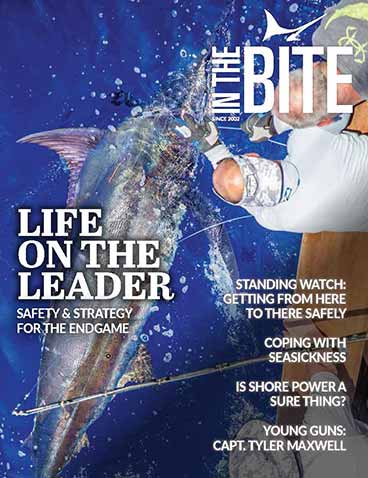
This article appeared in our Oct/Nov 2016 Edition of InTheBite The Professionals Sportfishing Magazine. Click to order your copy!
 Polygraphs and Fishing Tournaments: An expert opinion
When it comes to polygraphs and tournament fishing, there is perhaps no more credible voice than Mr. Neil Rucker. A veteran of more than 39 years administering polygraphs, Rucker performs tests for many of the Gulf coast major billfish, redfish, and bass tournaments. Rucker company, API Polygraph is based in Daphne, Alabama. He started his career as an Alabama State Trooper and was trained under the federal government polygraph school in 1976. When it comes to polygraphs for fishing tournaments, Rucker says, Ive probably run more of them than anybody.
When I first started with fishing tournaments in the mid-1980s, nobody was conducting exams and lots of people failed them. Now everybody passes them, Rucker describes. In his experience, administering polygraphs at fishing tournaments has decreased the amount of cheating that takes place. Usually rules violations occur when they dont expect polygraph tests.
A long time ago I was doing tests for a bass fishing tournament. There was a guy who lived on an island in the river north of Mobile. Before the tournaments, he would catch big bass and keep them alive to sell to tournament anglers, Rucker describes a particularly memorable episode in his fishing polygraph career. When it comes to things that the offshore tournaments want to know, it usually questions like”Did the person who hooked the fish have any assistance? he says. Often the question of tournament hours gets people”prefishing.
Not only has Rucker interviewed many of the top captains on the Gulf circuit, he generally interviews the same captains multiple times over the course of the summer. He describes his test procedure as follows: First is the pretest. You get background on the person, get general health information and whether or not they are taking medications. Then you ask them about the tournament rules. Then Ill review the questions. Then Ill run the test. The test is the shortest part, sometimes it takes 25-30 minutes, Rucker describes.
The equipment that Rucker uses is standard as well. These days I have a computerized polygraph. Well place pneumatic tubes around the upper chest and one around the lower. Well measure blood pressure. We also attach leads to their fingers to measure conductivity. It called Galvanic testing; it measures the sweat glands in the fingers. The subjects will also sit on top of a cushion to test movement”to see if they use counter measures, Rucker states.
Counter measures are actions deliberately done to throw off a polygraph test. When speaking of potential cheats wanting to elude the lie detector test, Rucker observations are telling of his experience. These guys will look up how to pass polygraphs on websites. They will put a tack in their shoe”but when they do that, the reactions are too sharp. The websites also tell them to tighten their sphincter muscles during the interview. Using a cushion with sensors in it, Rucker is able to determine the motions necessary to tighten up.
Does the thought of a polygraph make you nervous?
Every single soul I run on the polygraph test is nervous. It is the nature of the test¦ What if this guy screws up? Rucker says with a laugh. Everybody is nervous, from a fishing tournament to murder investigation. This has absolutely nothing to do with passing or failing the test, he says. If someone is telling the truth, theyll pass a polygraph test. Rucker continues, Generally, if you have a good polygraph examiner, if someone has a problem, they are trying to get around the rules.
Tournament Rules and work arounds
A look around the internet reveals that there are a number of people and groups that really, really dislike polygraph testing (see the sidebar). Whether or not you are for or against them, if you fish a tournament that utilizes polygraphs before distributing prize money, you may have to take one. Under this scenario, even if the thought of taking a lie detector test makes you sick, having to take one is a good thing”it means that you could be in line for some money.
What should you do in the event you have to take a polygraph? Follow the tournament rules. In spite of all of the money at stake, sportfishing is a gentleman pastime. If you follow the rules and keep everything above board, youll have nothing to worry about come exam time. On the other hand, if you try to cut a corner or two youll be a nervous wreck when a lie detector test stands between you and a million-dollar check.
Keep things in perspective. Polygraph tests are administered by hundreds of fishing tournament each year. The amount of controversy associated with them is minute”most go off without a hitch. The tests are administered my trained professionals with quite a bit of experience.
If you are still nervous about a lie detector test determining your fate, there may be a couple of work arounds. While tournament rules will still apply”and you will still have to take one before accepting your giant check”if you are convinced that the world is after you, you can always just record the whole tournament on video. Some commercial fishing vessels are required to utilize video monitoring systems to ensure that they comply with the rules. You can do the same thing. Just make sure your video is time and date stamped. For even more assurance, you can keep your trip plotter from your GPS, showing where you fished and when.
If video back up is still not enough assurance, you can ask Pope Francis for a ride along. A statement of accuracy from the Pope and a video of your whole tournament should serve you well. That being said, youll still have to take the test before claiming your check.
Fish Detector Tests
Polygraphs are standard issue in fishing tournaments. While there is sometimes controversy surrounding them, imagine the controversy that would exist without them. Being hooked up to pneumatic tubes and finger leads sounds quite a bit more appealing than the boiling water test. Think about how many fights on the dock do not happen because trained professionals interpret the results. Fish stories, after all, have their place, but that place is not in sportfishing tournaments.
An opposing viewpoint
There are many vocal critics of polygraph examinations. Speaking on the condition of anonymity, a former US Army polygrapher provided us with the top reasons he does not believe the tests are valid.
Polygraphs and Fishing Tournaments: An expert opinion
When it comes to polygraphs and tournament fishing, there is perhaps no more credible voice than Mr. Neil Rucker. A veteran of more than 39 years administering polygraphs, Rucker performs tests for many of the Gulf coast major billfish, redfish, and bass tournaments. Rucker company, API Polygraph is based in Daphne, Alabama. He started his career as an Alabama State Trooper and was trained under the federal government polygraph school in 1976. When it comes to polygraphs for fishing tournaments, Rucker says, Ive probably run more of them than anybody.
When I first started with fishing tournaments in the mid-1980s, nobody was conducting exams and lots of people failed them. Now everybody passes them, Rucker describes. In his experience, administering polygraphs at fishing tournaments has decreased the amount of cheating that takes place. Usually rules violations occur when they dont expect polygraph tests.
A long time ago I was doing tests for a bass fishing tournament. There was a guy who lived on an island in the river north of Mobile. Before the tournaments, he would catch big bass and keep them alive to sell to tournament anglers, Rucker describes a particularly memorable episode in his fishing polygraph career. When it comes to things that the offshore tournaments want to know, it usually questions like”Did the person who hooked the fish have any assistance? he says. Often the question of tournament hours gets people”prefishing.
Not only has Rucker interviewed many of the top captains on the Gulf circuit, he generally interviews the same captains multiple times over the course of the summer. He describes his test procedure as follows: First is the pretest. You get background on the person, get general health information and whether or not they are taking medications. Then you ask them about the tournament rules. Then Ill review the questions. Then Ill run the test. The test is the shortest part, sometimes it takes 25-30 minutes, Rucker describes.
The equipment that Rucker uses is standard as well. These days I have a computerized polygraph. Well place pneumatic tubes around the upper chest and one around the lower. Well measure blood pressure. We also attach leads to their fingers to measure conductivity. It called Galvanic testing; it measures the sweat glands in the fingers. The subjects will also sit on top of a cushion to test movement”to see if they use counter measures, Rucker states.
Counter measures are actions deliberately done to throw off a polygraph test. When speaking of potential cheats wanting to elude the lie detector test, Rucker observations are telling of his experience. These guys will look up how to pass polygraphs on websites. They will put a tack in their shoe”but when they do that, the reactions are too sharp. The websites also tell them to tighten their sphincter muscles during the interview. Using a cushion with sensors in it, Rucker is able to determine the motions necessary to tighten up.
Does the thought of a polygraph make you nervous?
Every single soul I run on the polygraph test is nervous. It is the nature of the test¦ What if this guy screws up? Rucker says with a laugh. Everybody is nervous, from a fishing tournament to murder investigation. This has absolutely nothing to do with passing or failing the test, he says. If someone is telling the truth, theyll pass a polygraph test. Rucker continues, Generally, if you have a good polygraph examiner, if someone has a problem, they are trying to get around the rules.
Tournament Rules and work arounds
A look around the internet reveals that there are a number of people and groups that really, really dislike polygraph testing (see the sidebar). Whether or not you are for or against them, if you fish a tournament that utilizes polygraphs before distributing prize money, you may have to take one. Under this scenario, even if the thought of taking a lie detector test makes you sick, having to take one is a good thing”it means that you could be in line for some money.
What should you do in the event you have to take a polygraph? Follow the tournament rules. In spite of all of the money at stake, sportfishing is a gentleman pastime. If you follow the rules and keep everything above board, youll have nothing to worry about come exam time. On the other hand, if you try to cut a corner or two youll be a nervous wreck when a lie detector test stands between you and a million-dollar check.
Keep things in perspective. Polygraph tests are administered by hundreds of fishing tournament each year. The amount of controversy associated with them is minute”most go off without a hitch. The tests are administered my trained professionals with quite a bit of experience.
If you are still nervous about a lie detector test determining your fate, there may be a couple of work arounds. While tournament rules will still apply”and you will still have to take one before accepting your giant check”if you are convinced that the world is after you, you can always just record the whole tournament on video. Some commercial fishing vessels are required to utilize video monitoring systems to ensure that they comply with the rules. You can do the same thing. Just make sure your video is time and date stamped. For even more assurance, you can keep your trip plotter from your GPS, showing where you fished and when.
If video back up is still not enough assurance, you can ask Pope Francis for a ride along. A statement of accuracy from the Pope and a video of your whole tournament should serve you well. That being said, youll still have to take the test before claiming your check.
Fish Detector Tests
Polygraphs are standard issue in fishing tournaments. While there is sometimes controversy surrounding them, imagine the controversy that would exist without them. Being hooked up to pneumatic tubes and finger leads sounds quite a bit more appealing than the boiling water test. Think about how many fights on the dock do not happen because trained professionals interpret the results. Fish stories, after all, have their place, but that place is not in sportfishing tournaments.
An opposing viewpoint
There are many vocal critics of polygraph examinations. Speaking on the condition of anonymity, a former US Army polygrapher provided us with the top reasons he does not believe the tests are valid.
- Polygraph tests cannot be quantified. Rather than giving a number, the test results must be interpreted by the examiner.
- There may be problems relating to the presuppositions of the examiner. This is similar to the old adage– If the judge believes that you are guilty¦ you are probably going to be found guilty (whether or not you committed he crime).
- There are problems created by people being afraid of the test. The same psychological responses follow from questions and experiences that are similar to the questions on the test. The subject may then become fearful of being asked questions, which may influence the results.
Our source goes on to point to several famous examples in which sociopaths were able to pass polygraph tests because lying did not evoke any different physiological response from telling the truth.













